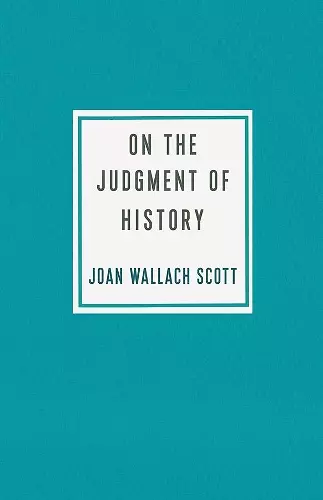On the Judgment of History
Format:Paperback
Publisher:Columbia University Press
Published:29th Sep '20
Should be back in stock very soon

In the face of conflict and despair, we often console ourselves by saying that history will be the judge. Today’s oppressors may escape being held responsible for their crimes, but the future will condemn them. Those who stand up for progressive values are on the right side of history. As ideas once condemned to the dustbin of history—white supremacy, hypernationalism, even fascism—return to the world, threatening democratic institutions and values, can we still hold out hope that history will render its verdict?
Joan Wallach Scott critically examines the belief that history will redeem us, revealing the implicit politics of appeals to the judgment of history. She argues that the notion of a linear, ever-improving direction of history hides the persistence of power structures and hinders the pursuit of alternative futures. This vision of necessary progress perpetuates the assumption that the nation-state is the culmination of history and the ultimate source for rectifying injustice. Scott considers the Nuremberg Tribunal and South Africa’s Truth and Reconciliation Commission, which claimed to carry out history’s judgment on Nazism and apartheid, and contrasts them with the movement for reparations for slavery in the United States. Advocates for reparations call into question a national history that has long ignored enslavement and its racist legacies. Only by this kind of critical questioning of the place of the nation-state as the final source of history’s judgment, this book shows, can we open up room for radically different conceptions of justice.
This book is a poignant and timely intervention that speaks to urgent questions in and of our present. It brilliantly enacts its own self-critical reassessment of widespread contemporary incredulity that virulent racism and nationalism are ‘still’ possible. Joan Wallach Scott turns to contemporary debates over the question of reparations for slavery in order to imagine alternative understandings and avenues for historical reckoning—and politics. -- Judith Surkis, author of Sex, Law, and Sovereignty in French Algeria, 1830–1930
On the Judgment of History is a stunning and timely meditation on history, both as a field of inquiry and as the broadest arena of human activity, and on justice, both as an ideal and as a state institution. This book will provoke intellectual excitement among a wide range of readers. -- Andrew Zimmerman, author of Alabama in Africa: Booker T. Washington, the German Empire, and the Globalization of the New South
Scott offers a forceful and persuasive critique of the modern Western tendency among liberals and orthodox Marxists to justify normative political projects on the grounds that they will be authorized by the 'judgment of history.' Challenging residual assumptions about linear, progressive, or teleological history, she questions any political logic which assumes that the rightness of current struggles will be ratified by future observers or that present harms will be redeemed by subsequent outcomes. Scott underscores how such problematic assumptions are grounded in both an attachment to national states and to a fixed boundary between the past and the present. Echoing throughout is a crucial question: what happens to politics when history no longer provides a secure ground for orienting action? This intervention demands the attention of historians, political theorists, and legal scholars. -- Gary Wilder, author of Freedom Time: Negritude, Decolonization, and the Future of the World
Scott has done her part to dismantle naïve metanarratives of progress, yet she was harboring one, all the same. The argument of On the Judgment of History aims right at that ambivalence, which has its roots in the commonplace desire to believe in the possibility of secular theodicy: that is, an account of the existence of evil that nonetheless assures us some good will come of it. The yearning is understandable but problematic. A belief that the long moral arc of the universe bends toward justice can be inspiring. But it also runs the risk of turning into complacency. -- Scott McLemee * Inside Higher Ed *
This is a book of reflection, deep reflection, not new research. The rewards of reading come from Scott’s penetrating analyses of familiar historical materials and her dialogue with other analysts, from Hannah Arendt to Michel de Certeau to Ta-Nehisi Coates * Critical Inquiry *
ISBN: 9780231196956
Dimensions: unknown
Weight: unknown
144 pages